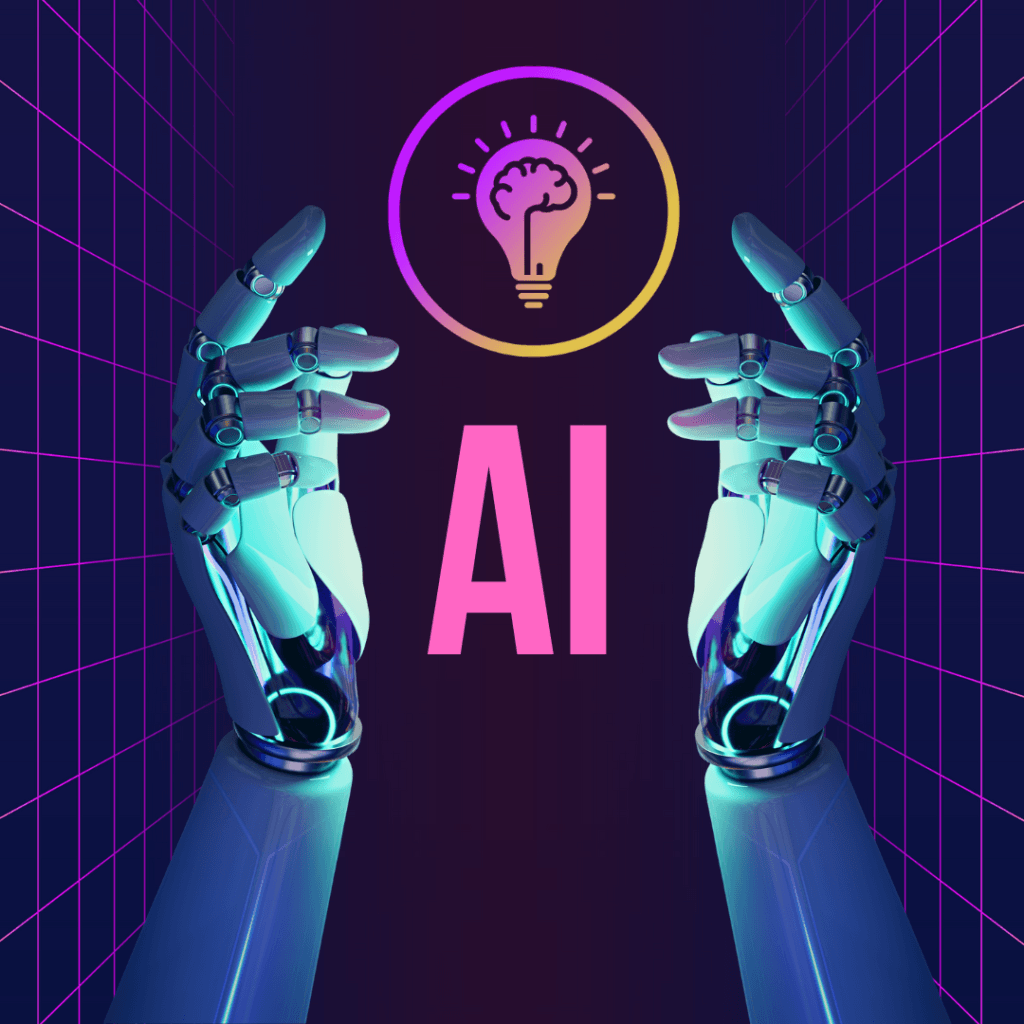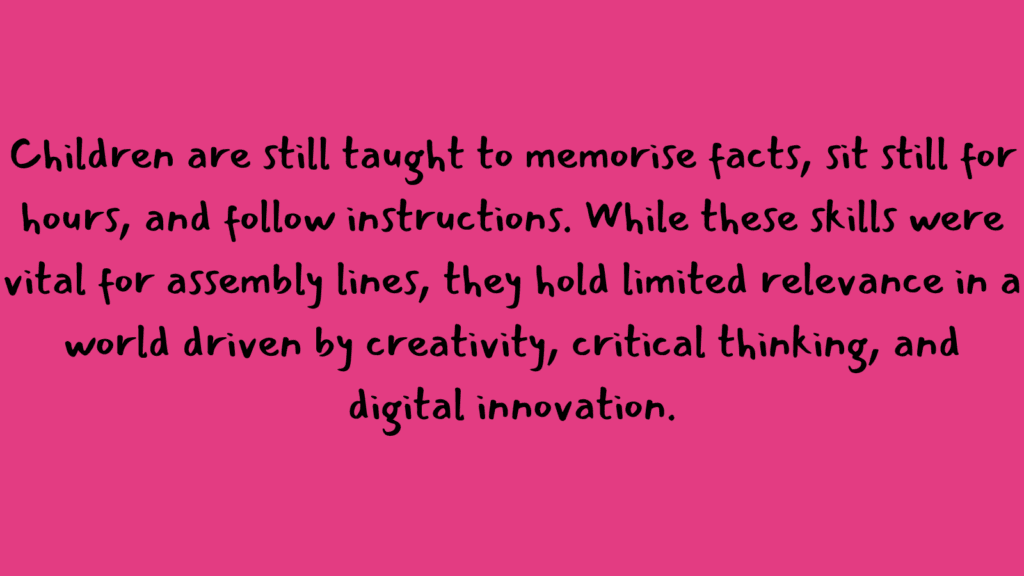In a world of rapid technological advancements, shifting societal norms, and a climate crisis that demands immediate attention, one question looms large: is education preparing children for a world that no longer exists? The traditional education system, largely designed during the industrial revolution, may no longer equip young minds for the challenges and opportunities of the 21st century. Here’s why we must rethink the way we educate our children and prepare them for an uncertain future.
As a parent, I witness this first-hand. From the challenges my children face in adapting to a rapidly changing world to the outdated approaches in their classrooms, the disconnect is clear. Having been a school governor for many years, I’ve also had a front-row seat to the struggles schools face in adapting to modern demands while clinging to outdated structures.
The Industrial Model of Education
The roots of modern education lie in the industrial age, where schools were designed to create disciplined workers for factories. Standardised curricula, rigid schedules, and hierarchical classroom structures mirrored the needs of that era. Fast forward to today, and this model remains largely unchanged, even though the demands of the workforce and society have shifted dramatically.
Children are still taught to memorise facts, sit still for hours, and follow instructions. While these skills were vital for assembly lines, they hold limited relevance in a world driven by creativity, critical thinking, and digital innovation.
How can we expect children to thrive in a world of artificial intelligence, global collaboration, and environmental challenges when their education system still measures success by how well they perform in rote memory tests?
Skills for the Future: The Glaring Gap
According to a report by the World Economic Forum, 65% of children entering primary school today will work in jobs that don’t yet exist. READ THAT AGAIN! Yet, many schools continue to prioritise traditional subjects over future-facing skills like digital literacy, emotional intelligence, and adaptability. The lack of emphasis on critical skills poses significant challenges:
- Creativity and Problem-Solving: With artificial intelligence automating repetitive tasks, creativity and complex problem-solving have become some of the most sought-after skills. How often, though, do our schools nurture these abilities?
- Collaboration and Communication: Globalisation and remote working have transformed how we interact. Yet, group projects and communication skills are often secondary to individual performance in traditional classrooms.
- Resilience and Adaptability: The fast pace of change demands individuals who can pivot quickly. Standardised tests, however, reward conformity over flexibility.
If these skills are what the future demands, why aren’t they front and centre in our classrooms? Are we failing our children by clinging to outdated traditions?
Technological Disruption: The Elephant in the Classroom
Technology has reshaped every facet of modern life—except, it seems, education. While children are adept at navigating devices and apps, the curriculum often lags behind in incorporating meaningful tech education. Skills like coding, data analysis, and cybersecurity remain optional or non-existent in many schools.
More concerningly, digital ethics—an essential component of navigating a tech-driven world—receives little to no attention. As children grow up surrounded by social media and AI-driven tools, their ability to critically evaluate digital information and use technology responsibly becomes paramount. How can we prepare them for a world increasingly influenced by artificial intelligence without equipping them with the tools to navigate it? Learn more about the role of AI in education here.
Mental Health: A Rising Concern
Modern challenges like climate anxiety, economic instability, and social media pressures have placed enormous mental health burdens on today’s youth. Yet, mental health education is often treated as an afterthought, with insufficient resources or training for teachers.
Building emotional intelligence and resilience should be core components of the curriculum, enabling children to manage stress, build healthy relationships, and navigate complex emotions. Could we be doing more to equip them for the pressures of modern life?
The Climate Crisis: Education’s Role
The climate crisis is one of the greatest threats facing future generations. However, many schools fail to equip children with the knowledge and skills to address this existential challenge. Environmental education, sustainability practices, and green innovation need to be central to curricula, fostering a generation that can lead the fight for a sustainable future. Discover more about the climate crisis and its impact here.
How can we expect the next generation to solve global problems if we’re not teaching them about these challenges in the first place?
What Needs to Change?
To prepare children for the realities of today and tomorrow, education must undergo a radical transformation. Here are some steps we can take:
- Redefine Success: Move beyond standardised testing to assess creativity, critical thinking, and emotional intelligence.
- Integrate Technology: Teach practical digital skills and ethical technology use to prepare children for the digital economy.
- Emphasise Lifelong Learning: Foster a mindset of continuous growth, adaptability, and curiosity.
- Prioritise Mental Health: Provide robust mental health resources and build emotional intelligence into the curriculum.
- Focus on Sustainability: Incorporate environmental education and promote green innovation in schools. Explore government efforts to modernise education at the Department for Education.
A Call to Action
The world our children will inherit is vastly different from the one our current education system was designed to address. As parents, educators, and policymakers, we must ask ourselves: Are we doing enough to prepare them for the challenges ahead?
We need to advocate for a system that values creativity, adaptability, and resilience over rote memorisation and conformity. Talk to your local schools, support initiatives that promote future-ready education, and hold policymakers accountable for meaningful change. Small steps can lead to significant transformations.
Education should not just prepare children to pass exams; it should prepare them to thrive in a rapidly evolving world. It’s time for all of us to come together and demand change—before it’s too late.
Conclusion
Our children’s future depends on an education system that evolves with the times. By embracing creativity, adaptability, and resilience, we can empower the next generation to build a brighter, more sustainable future. Let’s ensure that education is not a relic of the past but a beacon for the future.





